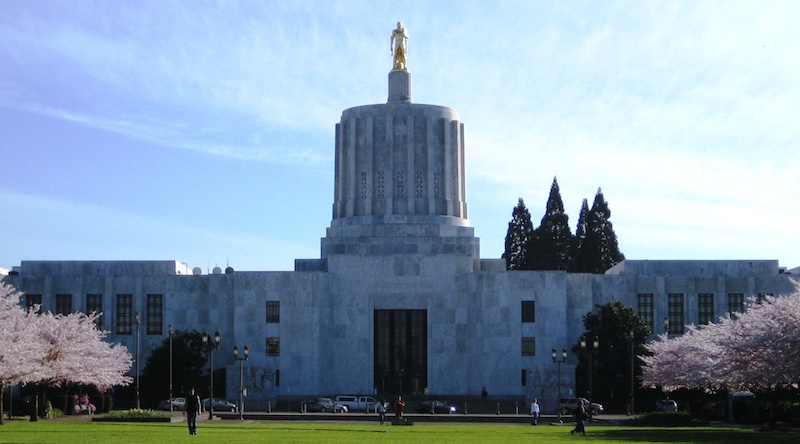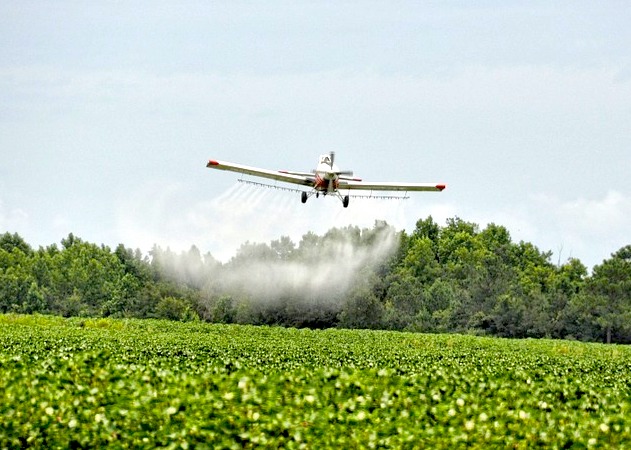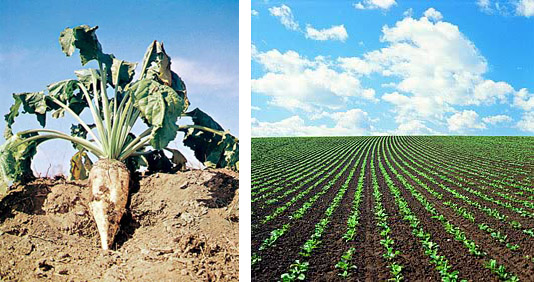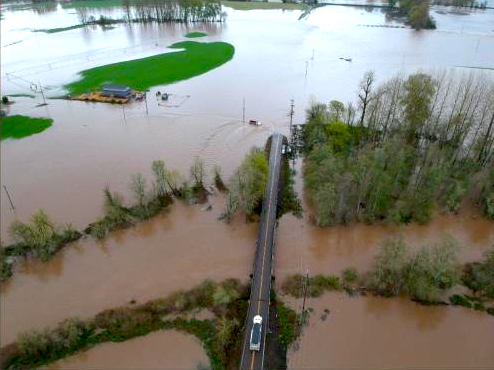
Your Food, Your Legislature: Time to Take Action!
With just a few weeks left in the 2019 session of the Legislature, it's time to get in gear and let your legislators know where you stand. Type your address into the box at the top of the directory and write or e-mail your own letter (addresses are included in the listings for each legislator), or copy and paste the sample letter below each bill. If you want to take an extra step, click on the "Current Committee" in the listings under the explanation and send a copy to each member of the committee.
 HB 2619 would ban the use of the toxic pesticide chlorpyrifos, a dangerous neurotoxin that affects brain development in young children. Here's a sample letter:
HB 2619 would ban the use of the toxic pesticide chlorpyrifos, a dangerous neurotoxin that affects brain development in young children. Here's a sample letter:
Dear [legislator],
I am writing to urge you to support HB 2619 and ban the use of the pesticide chlorpyrifos in Oregon so that children living in our state may have a permanent reprieve from exposure to the highly toxic pesticide.
Current exposure levels to this developmental neurotoxicant, by children ages one to two, exceed the US Environmental Protection Agency’s (EPA) own allowable threshold by a staggering 140 times.
Even at low levels of exposure by women during pregnancy, chlorpyrifos has been shown to alter brain functions and impair the learning ability of children into adulthood. Researchers at Columbia University have demonstrated that the presence of chlorpyrifos in the umbilical cord of developing fetuses is correlated with a decrease in psychomotor and mental development in three-year-olds. At high levels of childhood exposure, chlorpyrifos has been found to cause attention deficit, hyperactivity, slow cognitive development, a significant reduction in IQ scores and a host of other neurodevelopment problems. Children who live near farm fields experience the highest risks and impacts. A University of California Davis study found that women who resided within a mile of farms where chlorpyrifos and other organophosphate pesticides were applied had a 60 percent higher chance of giving birth to children with autism spectrum disorder.
Two states, Hawaii and California, have already passed bills banning this dangerous pesticide. I can only hope that the Oregon Legislature follows suit and declares our children are more important than corporations that profit from exposing them (and us) to toxic chemicals.
Thank you,
[your name]
[address]
* * *
 HB 2882 protects farmers by making the patent-holders of genetically engineered crops financially liable when their products contaminate neighboring farmers' fields. Sample text:
HB 2882 protects farmers by making the patent-holders of genetically engineered crops financially liable when their products contaminate neighboring farmers' fields. Sample text:
Dear [legislator],
I am writing to urge your support for HB 2882, which would protect Oregon farmers by holding the patent-holders of genetically engineered crops financially accountable when their products cause economic harm to farmers who experience unwanted contamination.
Contamination from genetically engineered crops can make organic and conventional crops unable to be sold. When these genetically engineered crops escape their fields, the contamination can cost farmers not just the value of that season's crops, but can can take years to eradicate, with the potential that the farmer would be deprived of a livelihood.
Oregon's family farmers and the integrity of our food supply should not be at the mercy of corporate agribusiness giants.
Thank you,
[your name]
[address]
 SB 727 supports the Double Up Food Bucks program that gives food assistance (SNAP) recipients assistance in purchasing locally grown fruits and vegetables from farmers' markets, farm share sites and retail outlets that participate in program. Note that very SNAP dollar spent at farmers market can generate $1.79 in local economic activity!
SB 727 supports the Double Up Food Bucks program that gives food assistance (SNAP) recipients assistance in purchasing locally grown fruits and vegetables from farmers' markets, farm share sites and retail outlets that participate in program. Note that very SNAP dollar spent at farmers market can generate $1.79 in local economic activity!
Dear [legislator],
I am writing to urge your support for SB 727, which supports the expansion of Double Up Food Bucks Oregon, a SNAP incentive program with a proven record of success.
For every dollar spent on SNAP-eligible foods at participating farmers markets, farm share programs, and grocery stores across the state, shoppers will receive a dollar to spend on Oregon-grown fruits and vegetables. State appropriations have successfully funded similar statewide SNAP incentive programs in CA, MA, MI, MN and NM.
Passage of this bill would:
- Allow 250,0000 low-income Oregon families will be able to expand their buying power and consume more fruits and vegetables
- Connect family farmers with new customers, giving them a financial boost
- Encourage our local economies will grow: every SNAP dollar spent at farmers market can generate $1.79 in local economic activity
- Enable all farmers markets in Oregon to accept SNAP, by providing technical assistance: currently 25% of Oregon’s farmers markets are not currently accepting SNAP
- Enable all farmers markets in Oregon to offer SNAP matching programs: currently they exist at only 60 of Oregon’s 120 farmers markets. This leaves many rural markets without any SNAP matching program.
- Leverage future federal, other public and private matching dollars to ensure the long-term sustainability of the program.
Voting for this bill helps Oregonians in need to increase their access to fresh, local food, but it will also support family farmers and boost our economy.
Thank you,
[your name]
[your address]
* * *
 HB 2020, the Clean Energy Jobs bill, would cap greenhouse gas emissions from most large industrial sources—those that emit more than 25,000 metric tons of carbon dioxide (or equivalent) per year—and effectively put a price on carbon. Currently large industrial farms are excluded from this cap, though one of the largest emitters of ammonia gas in the country is Threemile Canyon Farms in Boardman.
HB 2020, the Clean Energy Jobs bill, would cap greenhouse gas emissions from most large industrial sources—those that emit more than 25,000 metric tons of carbon dioxide (or equivalent) per year—and effectively put a price on carbon. Currently large industrial farms are excluded from this cap, though one of the largest emitters of ammonia gas in the country is Threemile Canyon Farms in Boardman.
Dear [legislator],
I am writing to urge that HB 2020, the Clean Energy Jobs bill, include large industrial farms in its cap on greenhouse gases.
Climate change is a growing threat to Oregon agriculture. From extreme, unpredictable weather and drought, to declining water supplies, our rural communities, farms, and ranches are experiencing dramatic changes to the climate. While we need to stabilize the climate by reducing industrial and other large sources of greenhouse gas emissions, we also need to invest in climate-friendly agricultural practices. Oregon needs to offer a framework for Oregon’s farmers and ranchers to be a part of the solution by providing grants to engage in climate-friendly agricultural practices.
Under HB 2020, emissions from agriculture are generally exempted from the cap on emissions, even for individual large sources that exceed 25,000 metric tons per year in CO2 equivalent like mega-dairies and feedlots with more than approximately 10,000 cows. Because they are exempt from the cap, these very large operations may also qualify for "offset" funding under the bill, which are for emissions reduction projects that most smaller farms are unlikely to qualify for.
I am requesting that:
- A minimum of 20% of the Climate Investment Fund allocated for activities on natural and working lands.
- Applying the cap on emissions to large agricultural sources that exceed 25,000 metric tons CO2 equivalent emissions per year (for example, mega-dairies or large feedlots with at least 10,000 cows).
- The creation of a Healthy Soils Program and an Alternative Manure Management Program like those in California which have generated millions of dollars in grants for farmers to engage in climate friendly practices.
- Sustainable agriculture or small farm representation on the Climate Investment Fund advisory committee.
Thank you,
[your name]
[your address]
